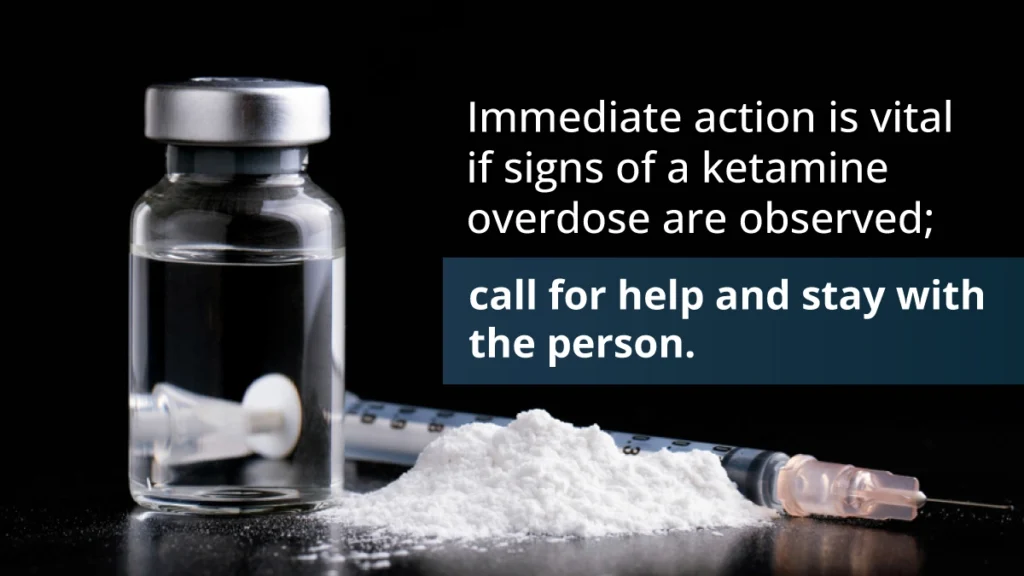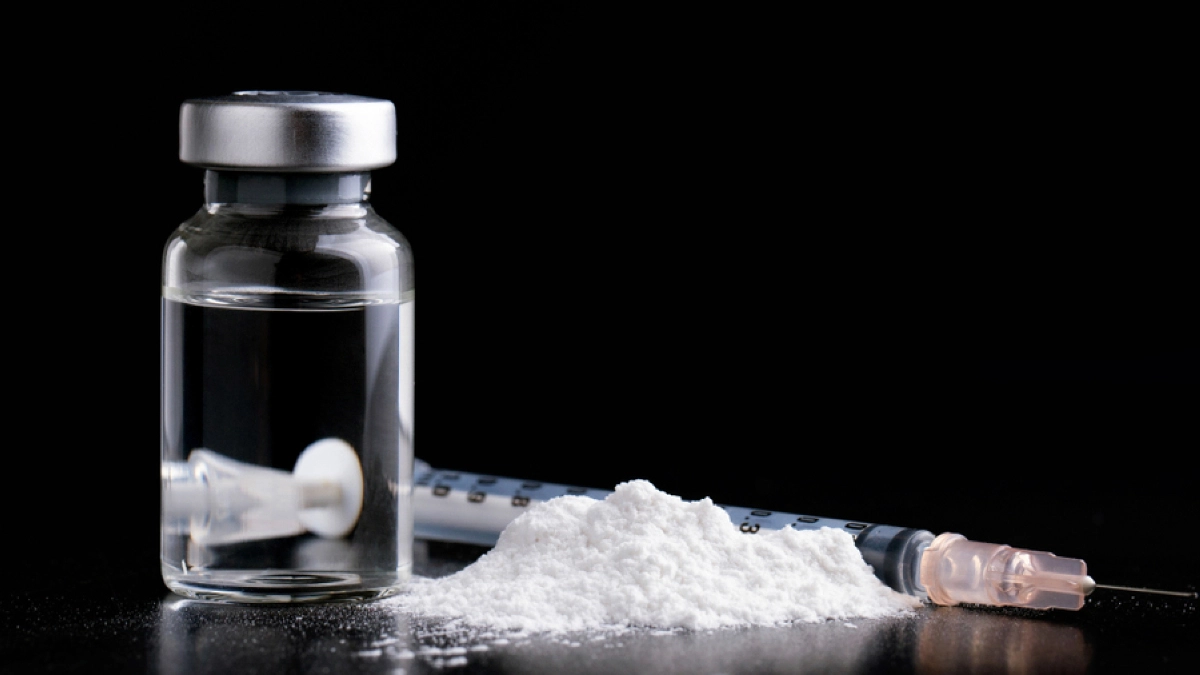Ketamine overdose occurs when someone takes too much of the drug, commonly used as an anesthetic and for illicit recreational purposes. Misuse can lead to severe symptoms, including confusion, hallucinations, and impaired motor function.
In extreme cases, it may result in respiratory distress or even coma. Seeking immediate medical attention is crucial if a ketamine overdose is suspected. It is vital to note that timely intervention for drug addiction can help prevent severe consequences and ensure the person’s well-being.
Key Takeaways
Recognizing signs of ketamine overdose is crucial for getting help on time and preventing severe health consequences. Here’s what you need to know:
- Misusing ketamine in high doses can lead to respiratory distress and other dangerous overdose symptoms.
- Immediate action is vital if signs of a ketamine overdose are observed; call for help and stay with the person.
- Achieving lasting recovery involves recognizing the need for help and engaging support groups.
The Haven Detox-New England can help you lead a sober life. For treatment, contact us today at (844) 933-4145.

Recreational Use and Overdose Risk
Engaging in recreational ketamine use can expose a person to overdose risks, especially when taking high doses of the substance. Ketamine misuse may lead to withdrawal symptoms, impacting the person’s well-being. Ingesting high doses of ketamine can result in elevated heart rate, high blood pressure, and respiratory depression.
These effects heighten the likelihood of an overdose, posing severe health dangers. It is vital for individuals involved in ketamine use to be aware of these risks and seek help if needed. Understanding the potential consequences can contribute to making informed choices and promoting safer practices in recreational drug use.
Recognizing Ketamine Overdose
Understanding the signs of a ketamine overdose is vital in mitigating the potential risks associated with its use. It is essential to be aware of the dissociative anesthetic’s impact on glutamate receptors and its potential to exacerbate health conditions.
Physical Symptoms
Recognizing symptoms of a ketamine overdose involves observing various physical signs. In severe cases, high doses of ketamine can lead to respiratory depression, impacting breathing and oxygen intake.
Elevated heart rate and high blood pressure are common physical symptoms associated with dissociative drug misuse. Chronic ketamine misuse may contribute to ketamine bladder syndrome, causing urinary problems and pain.
Psychological Symptoms
Ketamine, known for its dissociative effects, can induce hallucinogenic experiences, altering the mind’s perception. In cases of ketamine overdose and addiction, individuals may exhibit extreme confusion, disorientation, and near-death experiences. Mental health conditions that coexist with addiction may exacerbate these psychological symptoms.
Behavioral Symptoms
Observing behavioral changes is crucial in identifying ketamine overdose. Substance use disorders, particularly ketamine addiction, may manifest through persistent drug-seeking behavior.
Ketamine, often used as a club drug, can result in risky behaviors and impaired judgment. Lower doses of ketamine might initially provide pain relief, but in higher amounts, the risk of overdose and negative behavioral effects increases.
Health Risks Associated With Ketamine Overdose
Ketamine, also known as “Special K,” is a dissociative anesthetic drug with hallucinogenic effects. While it may be used medically in controlled settings, the misuse and high doses of the drug pose significant health risks.
Short-Term Health Implications
High doses of ketamine can lead to a range of negative side effects, including high blood pressure and a mind-altering state known as the “k-hole.” In some cases, people using ketamine recreationally may exhibit heightened anxiety, panic attacks, or extreme agitation, requiring urgent medical attention.
Young people experimenting with ketamine may find themselves in an emergency room due to the drug’s toxic buildup, experiencing dissociation from reality. These short-term health problems emphasize the importance of understanding the risks associated with ketamine use to prevent immediate harm.
Long-Term Health Implications
For those engaging in long-term ketamine use, there are enduring health concerns. Continuous exposure to higher doses can result in ketamine toxicity, potentially leading to ketamine use disorder. The cardiac output may be affected, putting users at risk for heart-related issues.
Moreover, the use of ketamine has been associated with an increased vulnerability to sexual assault, especially among young adults. It’s crucial to note that ketamine, when not used as directed and as a nasal spray, is not FDA-approved for recreational purposes. That further amplifies the risks associated with its misuse.
The misuse of ketamine, especially in high doses, can have both short-term and long-term health implications. That emphasizes the need for awareness and caution regarding the potential dangers of this mind-altering drug.
What to Do if Someone Overdoses
If someone shows clear signs of a ketamine overdose, quick action is crucial. While waiting for medical professionals, here are steps you can take to help:
- Call for Help: Dial emergency services dial 911 immediately.
- Stay Calm: Keep the person calm and reassure them.
- Monitor Breathing: Check if they are breathing; if not, start CPR.
- Stay with Them: Do not leave the person alone until medical professionals arrive.
Ketamine overdose treatment is time-sensitive, and recognizing symptoms of ketamine overdose is vital in preventing fatal overdoses.
Remember, misuse of this party drug can lead to addiction, highlighting the importance of understanding and addressing symptoms of ketamine addiction. Always seek professional help for a comprehensive approach to dealing with psychedelic drugs and their potential risks.
Treatment for Long-Term Sobriety
Achieving long-term sobriety is possible with the right treatment and support. The first step is recognizing the need for help, often serving as a wake-up call for individuals facing addiction. Seeking treatment in a clinical setting, such as a treatment center, provides access to comprehensive addiction treatment services.
Medical practitioners play a crucial role in addressing not only the immediate concerns but also the underlying factors contributing to addiction. Tailored treatment options, including support groups and medication-assisted treatment, aid patients in their journey toward recovery. These interventions address the impact on mental and physical health, considering the nervous system and potential cardiac conditions.
Frequently Asked Questions (FAQ)
What are the risks of ketamine?
Using ketamine comes with risks, including the potential for a “ketamine high” that alters perception and consciousness. This mind-altering state increases the likelihood of accidental injury.
The dissociative effects of ketamine may lead to impaired judgment, making individuals more susceptible to harm. It’s crucial to be aware of these risks and approach ketamine use with caution to prioritize safety and well-being.
How harmful is ketamine compared to other drugs?
Ketamine, while deemed safer than some drugs, poses risks. It can lead to physical and mental health issues, especially with misuse. Its hallucinogenic properties may impact judgment, potentially causing harm. Comparatively, its harm level varies, emphasizing the importance of informed and responsible use to mitigate risks.
Can ketamine be addictive when given for pain relief?
Ketamine, when used for pain relief under medical supervision, has a lower risk of addiction. However, misuse or self-medication can lead to dependency. While not as addictive as some pain medications, caution and adherence to prescribed doses are essential to avoid potential addiction issues.
Beat Ketamine Addiction at The Haven Detox-New England
Ketamine addiction increases the risk of overdose. Taking preventive measures and seeking help for a sober life can improve your overall health. The Haven Detox-New England is here to assist you during these tough times.
We provide detox under medical care and ensure your body safely removes harmful toxins. Our residential treatment offers a supportive environment and therapy programs to aid patients in breaking free from the addiction cycle.
We understand that mental illnesses can coexist with addiction, which can impact the recovery process. Our dual-diagnosis treatment plan provides treatment services to address both conditions simultaneously.
It is time to embrace hope and recovery. Contact us today at (844) 933-4145 for more information.
Verify Insurance
Let’s get you or a loved one help with a few simple steps.




